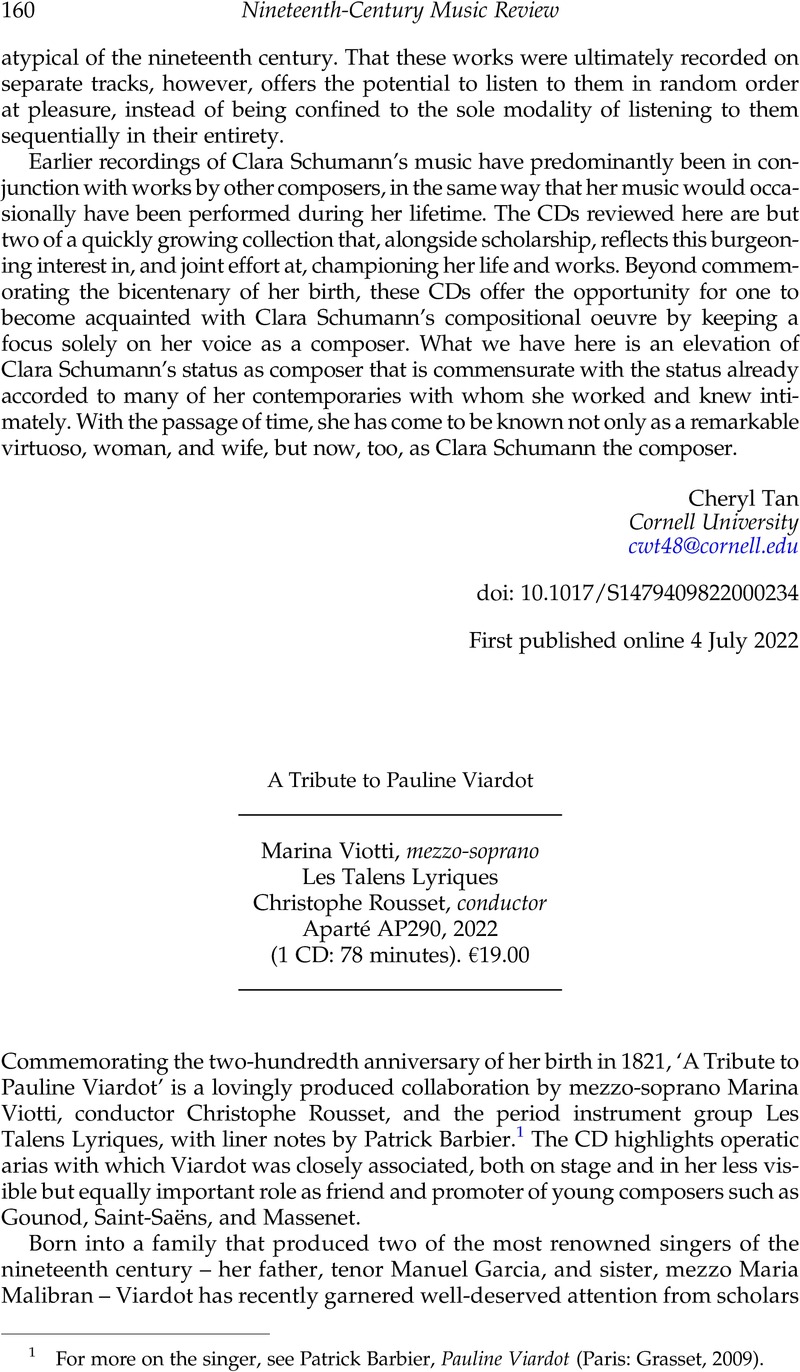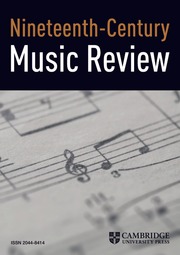No CrossRef data available.
Article contents
A Tribute to Pauline Viardot Marina Viotti, mezzo-soprano Les Talens Lyriques Christophe Rousset, conductor Aparté AP290, 2022 (1 CD: 78 minutes). €19.00
Review products
Published online by Cambridge University Press: 15 September 2023
Abstract

- Type
- CD Review
- Information
- Nineteenth-Century Music Review , Volume 21 , Special Issue 1: Clara Schumann: Changing Identities and Legacies , April 2024 , pp. 160 - 166
- Copyright
- Copyright © The Author(s), 2023. Published by Cambridge University Press
References
1 For more on the singer, see Barbier, Patrick, Pauline Viardot (Paris: Grasset, 2009)Google Scholar.
2 Keefer, Lubov, ‘The Opera Librettos of Ivan Turgenev’, The Slavic and East European Journal 10/2 (1966): 138CrossRefGoogle Scholar. Sand dedicated her novel, Consuelo, to Viardot.
3 Kyle, Amy Damron, ‘Un-Gendering Genius: Re-writing How we Perceive Musical Genius through the Life of Pauline Viardot-García’, in Musicology and Its Future in Times of Crises (Zagreb: University of Zagreb, 2022): 118Google Scholar.
4 On the connection to Chopin, see Berger, Francois, ‘Histoire d'une amitie: Frederic Chopin et Pauline Viardot’, in Chopin and His Work in the Context of Culture, ed. Poniatowska, Irena (Kraków: Polish Chopin Academy, 2003): 130–50Google Scholar; and Harley, Maria Anna, ‘Chopin and Women Composers: Collaborations, Imitations, Inspirations’, The Polish Review 45/1 (2000): 29–50Google Scholar.
5 Further on the disconnect between gender and genius, see Kyle, ‘Un-Gendering Genius’: ‘Exceptional women were perceived as such an anomaly that to accommodate the fact, writers like Diderot referred to great female figures like Sophie Volland as a “man”, and Jules and Edmond de Goncourt surmised that George Sand, Germaine de Staël and Pauline Viardot were hermaphrodites.’ 122.
6 Keefer, ‘The Operetta Librettos of Ivan Turgenev’, 151n31. Of her compositions, ‘Turgenev was especially fond of Pauline's La Chapelle, L'Ombre et le jour, and Adieu aux beaux jours (in Album de MMe Viardot Garcia [Paris 1843])’. Keefer also tells us that, in a letter to Viardot of 19 June 1865, Turgenev offered ‘a novel in exchange for a sonata’.
7 Kendall-Davies, Barbara, The Life and Work of Pauline Viardot, 2nd ed. (Cambridge: Cambridge Scholars, 2013): 1:60Google Scholar.
8 Poriss, Hilary, ‘Redefining the Standard: Pauline Viardot and Gluck's Orphee’, The Oxford Handbook of the Operatic Canon, ed. Newark, Cormac and Weber, William (Oxford: Oxford University Press, 2020): 363Google Scholar.
9 Poriss, ‘Redefining the Standard’, 375.
10 Kendall-Davies, The Life and Work of Pauline Viardot, 1:331.
11 Poriss, ‘Pauline Viardot, On Rivalry’, in Tracing Operatic Performances in the Long Nineteenth Century: Practices, Performers, Peripheries, ed. Anne Kaupalla, Ulla-Britta Broman-Kananen and Jens Hesselager (Helsinki: University of the Arts Helsinki, 2017): 36.
12 Poriss, ‘Redefining the Standard’, 368–9.
13 Gossett, Philip, Divas and Scholars: Performing Italian Opera (Chicago: University of Chicago Press, 2006), 321–2CrossRefGoogle Scholar.
14 Sheinberg, Esti, ‘“The Infinite Grace of Jesus”: Massenet's Marie-Magdeleine and Tchaikovsky’, Music and Letters 91/2 (2010): 146–7CrossRefGoogle Scholar.
15 Poriss, Hilary, ‘Pauline Viardot, Travelling Virtuosa’, Music and Letters 96/2 (2015): 195CrossRefGoogle Scholar.
16 Kendall-Davies, The Life and Work of Pauline Viardot, 1:213.
17 Hart, Beth, ‘The Loves of Hector Berlioz, in His Life and in Les Troyens’, The Opera Quarterly 19/3 (2003): 338CrossRefGoogle Scholar.
18 Melina Esse, ‘The Sexual Politics of Operatic Collaboration: Gounod, “Ô ma lyre immortelle” (Sapho), Sapho, Act III’, Cambridge Opera Journal 28/2 (2016): 173.
19 Melanie Von Goldbeck, ed., Lettres de Charles Gounod à Pauline Viardot (Arles: Actes Sud, 2015): 161; cited in Esse, The Sexual Politics’, 171.
20 Friang, Michèle, Pauline Viardot au miroir de sa correspondance (Paris: Hermann, 2008), 108Google Scholar; cited in Esse, The Sexual Politics’, 172.
21 Horne was closely identified with the Viardot tradition: ‘One of the most wonderful things ever given me was a beautiful portrait Viardot drew of herself. Her granddaughter, who died only last year, sent it to me when I made my debut at the Paris Opéra five years ago. She wrote me that she felt I was the only singer today who was carrying on the vocal traditions of the Garcia family. For that reason alone, I feel an extra sense of responsibility singing this role [Fidès in Meyerbeer's Le Prophète] that was so carefully tailored for Pauline Viardot’; Peter G. Davis, ‘Marilyn Horne Puts Prophecy to the Test’, New York Times (11 January 1977).
22 Bartoli has run the Festival since 2012, with an emphasis on female figures; the 2020 iteration focusing on Viardot was cancelled due to Covid-19.
23 See especially Isabel Bayrakdarian's 2004 Analekta recording (AN 2 9903) of Viardot's French, German, and Italian songs; and Ina Kancheva's 2016 Toccata Classics disc (TOCC0303) with Viardot's Mazurkas and 15 of her many Russian songs on texts of Pushkin, Lermontov, Turgenev, Fet, Koltsov, and Tutchev.





